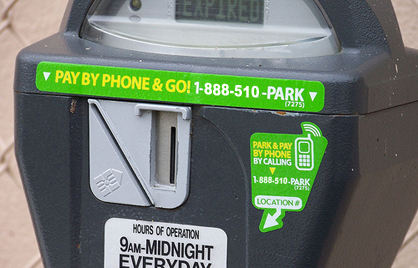New York City drivers will soon be able to pay the parking meter using their cell phones, a technological advance common in European cities and spreading quickly across the United States. A year-long, 300-space pilot will roll out this spring with the possibility of a more widespread implementation after that. It remains to be seen, however, whether the city will treat pay-by-phone as a standalone convenience for drivers or as one piece of a comprehensive rethinking of parking policy, pricing, payment and enforcement.
The pilot will cover 300 spaces in an outer-borough neighborhood with a busy commercial strip, reported the Post today. According to the official RFP for the project, that breaks down to 264 single-space meters and 57 spaces inside a municipal lot.
Under the pay-by-phone system, motorists would have to register their vehicles and credit cards online once before parking. They'd circle for an empty spot as normal and once they've parked, either call a posted telephone number, use a smartphone app or possibly send a text message to start the clock running. The technology would allow drivers to receive alerts when their time was about to expire and add more time to the meter, up to the legal limit, from wherever they are.
No matter what, this is a worthwhile technological upgrade to the city's on-street parking system. Having to lug around quarters, or even head back outside to feed the meter, is a hassle that isn't necessary in this day and age.
In an interview with Streetsblog last year, City Council Transportation Committee chair Jimmy Vacca told us he'd be very excited by a pay-by-phone system.
Pay-by-phone becomes really powerful, though, when paired with a broader suite of parking changes. That was DOT's vision in a request for expressions of interest it put out last September. There, pay-by-phone would have been integrated with sensors embedded in the road to enable dynamic pricing of parking based on demand and automatic enforcement of parking laws. The system would even have enabled the city to crack down on placard abuse by taking some discretion away from human ticketing agents.
That integrated approach also how pay-by-phone is used abroad. In a January report on innovative parking policy in European cities put out by the Institute for Transportation and Development Policy, every single city used pay-by-phone as part of their toolkit.
The trick is that, politically, pay-by-phone can pave the way for other, less-popular innovations. "Pay-by-phone is also a good way to get political buy-in for introducing performance pricing," wrote ITDP in its report, "because it makes parking so much easier for drivers, who don’t need to look for coins or rush back to a meter when running late." People are willing to pay more if they get more, especially if the link is made clear. Pay-by-phone was an important part of San Francisco's pioneering SFPark system. American cities like Miami and Washington, D.C. are also embracing pay-by-phone. We're awaiting a response from DOT about whether pay-by-phone will eventually be part of a larger high-tech parking system for the city.
A small pilot like this one isn't the place to implement those wider-ranging changes -- right now, the goal is to make sure the technology works for the New York City context -- but it sets the stage for them. Keep an eye out.






